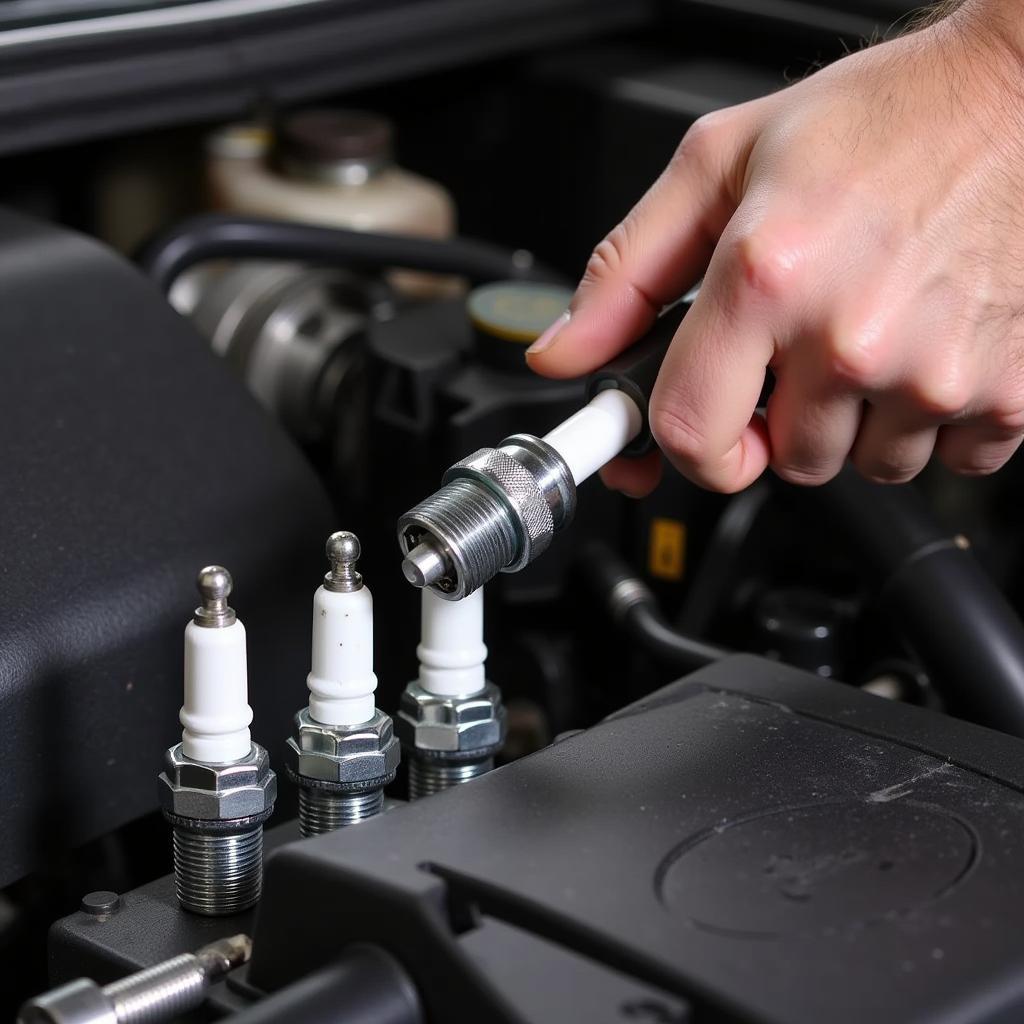If your car won’t start and you suspect spark plugs problems, you’ve come to the right place. This guide dives deep into the common causes, symptoms, and solutions related to spark plug issues that prevent your car from starting. We’ll explore everything from diagnosing the problem to replacing faulty spark plugs, empowering you to get your car back on the road. car won t start spark plugs problems
Understanding the Role of Spark Plugs
Spark plugs ignite the air-fuel mixture in your engine’s cylinders, initiating the combustion process that powers your vehicle. When spark plugs malfunction, this process is disrupted, leading to starting problems or even a complete engine failure. A variety of factors can contribute to spark plug problems, ranging from normal wear and tear to more complex electrical issues.
Common Symptoms of Faulty Spark Plugs
Recognizing the signs of bad spark plugs is crucial for early diagnosis and preventing further damage. Some common symptoms include:
- Difficulty starting: This is often the first and most noticeable sign. Your car may crank, but the engine won’t turn over.
- Rough idling: The engine may run unevenly or vibrate excessively when idling.
- Reduced fuel economy: Worn-out spark plugs can lead to incomplete combustion, wasting fuel and lowering your mileage.
- Lack of acceleration: You might experience sluggish acceleration and reduced engine power.
- Engine misfires: The engine may stutter or hesitate, especially under acceleration.
- Check engine light: A persistent check engine light can indicate spark plug problems or other related issues.
simple problems that cause a car to not start
Diagnosing Car Won’t Start Spark Plugs Problems
If you suspect car won’t start spark plugs problems, here’s how to diagnose them:
- Visually inspect the spark plugs: Remove a spark plug and look for signs of wear and tear, such as cracks, carbon buildup, or excessive electrode wear.
- Check the spark plug gap: Use a gap tool to ensure the gap between the electrodes is within the manufacturer’s specifications.
- Test the spark plugs: Use a spark plug tester to verify that each spark plug is firing correctly.
- Check the ignition coils: Faulty ignition coils can also prevent the spark plugs from firing properly.
How to Fix Car Won’t Start Spark Plugs Problems
Once you’ve diagnosed the problem, follow these steps to fix it:
- Replace worn-out spark plugs: If the spark plugs are worn out, replace them with new ones that meet the manufacturer’s specifications.
- Adjust the spark plug gap: If the gap is incorrect, adjust it using a gap tool.
- Replace faulty ignition coils: If the ignition coils are faulty, replace them with new ones.
- Check for other related issues: Sometimes, spark plug problems can be a symptom of a larger issue, such as a faulty fuel pump or a clogged fuel filter. Be sure to address any underlying problems.
Preventing Future Spark Plug Problems
Regular maintenance is key to preventing future spark plug problems. Here are some tips:
- Replace spark plugs according to the manufacturer’s recommended interval.
- Use quality fuel and avoid running your car on low fuel.
- Address any engine misfires promptly.
 Installing New Spark Plugs
Installing New Spark Plugs
“Regularly inspecting and replacing spark plugs is a cost-effective way to avoid more significant engine problems down the road,” advises John Smith, a certified automotive technician with over 20 years of experience. “It’s a simple procedure that can save you a lot of headaches in the long run.”
When to Seek Professional Help
While some spark plug issues can be addressed by DIYers, it’s best to seek professional help if you’re unsure about anything. A qualified mechanic can quickly and accurately diagnose the problem and recommend the appropriate repairs. how to deal with car problems
“If your car exhibits persistent starting problems, don’t hesitate to consult a professional,” adds Jane Doe, an automotive engineer. “Ignoring the problem can lead to further damage and potentially more expensive repairs.”
Conclusion
Addressing car won’t start spark plugs problems promptly is crucial for maintaining your vehicle’s performance and reliability. By understanding the symptoms, diagnosis, and solutions, you can take proactive steps to avoid costly repairs and ensure a smooth driving experience. If you need assistance, connect with AutoTipPro at +1 (641) 206-8880 or visit our office at 500 N St Mary’s St, San Antonio, TX 78205, United States.
FAQ
-
How often should I replace my spark plugs? Check your owner’s manual for specific recommendations, but generally, every 30,000 to 100,000 miles.
-
Can bad spark plugs damage my engine? Yes, faulty spark plugs can cause misfires, which can eventually damage the catalytic converter and other engine components.
-
How much does it cost to replace spark plugs? The cost varies depending on the make and model of your car, but it’s typically a relatively inexpensive repair.
-
Can I replace spark plugs myself? Yes, it’s a relatively easy DIY project if you have some basic mechanical skills.
-
What are the signs of a bad ignition coil? Symptoms similar to bad spark plugs like misfires, rough idling, and difficulty starting.
-
What causes spark plugs to foul? Oil leaks, rich fuel mixtures, and worn-out engine components.
-
Can I clean my spark plugs instead of replacing them? You can try cleaning them, but replacing them is generally recommended for optimal performance.





Leave a Reply